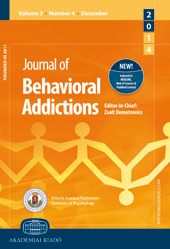The impact of exposure to wagering advertisements and inducements on intended and actual betting expenditure: An ecological momentary assessment study
The impact of exposure to wagering advertisements and inducements on intended and actual betting expenditure: An ecological momentary assessment study
Author(s): Matthew Browne, Nerilee Hing, Alex M.T. Russell, Anna Thomas, Rebecca JenkinsonSubject(s): Behaviorism
Published by: Akadémiai Kiadó
Keywords: marketing; advertising; inducements; betting; intentions; expenditure
Summary/Abstract: Background and aims. Research suggests that a large proportion of regular sports and race bettors experience harm related to their gambling. In Australia, people who bet regularly are targeted by a proliferation of different forms of inducements and advertising – many of which are believed to encourage excessive betting and erroneous perceptions of risk. However, scant research has examined the impact of marketing messaging to this group, which is also limited to cross-sectional or qualitative designs. We aimed to determine whether exposure to wagering advertisements and inducements influenced intended betting expenditure, actual betting expenditure, and spending more than intended. Methods. We report on an ecological momentary assessment study, measuring regular exposure to 20 different forms of marketing, as well as wagering spend from 318 race bettors and 279 sports bettors. Up to 15 assessments per participant were conducted over 3 weeks (mean = 11.46, median = 14), yielding 6,843 observations for analysis. Results. Exposure to advertising and inducements was reliably linked to a greater likelihood of betting, higher intended and actual betting expenditure, and spending more than intended. “Push” messaging and inducements that convey the impression of reduced risk (stake-back inducements and multibet offers) were particularly influential, as well as brands promoted during events and advertisements on betting websites/apps. Discussion and conclusions. Given that a large proportion of regular sports and race bettors experience problems, restrictions on these forms of marketing are advisable. These findings suggest that this is particularly important for marketing that is “pushed” to gamblers or that suggests reduced risk.
Journal: Journal of Behavioral Addictions
- Issue Year: 8/2019
- Issue No: 1
- Page Range: 146-156
- Page Count: 11
- Language: English

